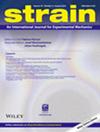基于磁记忆法的铁磁性钢低周疲劳累积塑性损伤定量评价
IF 1.8
3区 材料科学
Q2 MATERIALS SCIENCE, CHARACTERIZATION & TESTING
引用次数: 7
摘要
低周疲劳状态下的累积塑性损伤会严重危害钢构件的安全,甚至导致严重的工业事故。磁记忆法作为一种新型的无损检测技术,用于铁磁材料的疲劳损伤评估,但目前还缺乏对磁记忆信号与累积塑性损伤之间关系的定量描述。本文建立了基于应变的LCF循环荷载下的Jiles-Atherton滞回模型。同时,对S355钢进行了LCF试验,采集了不同加载周期下试件表面的HSF信号。采用基于应变的Jiles-Atherton磁滞模型对磁记忆信号与累积塑性应变的耦合进行了有限元模拟。通过与实验结果的比较,验证了有限元方法的可行性和准确性。结果表明,HSF信号拟合曲线的斜率K作为特征参数,随着累积塑性损伤D的增大呈指数递减。通过讨论不同因素对K-D关系曲线的影响,建立了磁损伤模型的通用定量表达式。验证结果表明,磁损伤模型为定量评价低碳钢在LCF作用下的累积塑性损伤提供了一种直接的方法。本文章由计算机程序翻译,如有差异,请以英文原文为准。
Quantitative evaluation of cumulative plastic damage for ferromagnetic steel under low cycle fatigue based on magnetic memory method
Cumulative plastic damage caused during the low cycle fatigue (LCF) regime may seriously undermine the safety of the steel members and even lead to serious industrial accidents. Magnetic memory method (MMM), as a novel nondestructive testing technology, has been developed to evaluate the fatigue damage for the ferromagnetic material, but there is the lack of a quantitative description exists for the relationship between magnetic memory signals and cumulative plastic damage yet. In this paper, the strain‐based Jiles–Atherton hysteresis model under cyclic load during the LCF regime was established. Meanwhile, the LCF tests for S355 steel were performed, and the HSF signals on the surface of the specimen were collected under different loading cycles. Finite element (FE) simulations for coupling magnetic memory signals and cumulative plastic strain were carried out by the strain‐based Jiles–Atherton hysteresis model. Comparing with experimental results verifies the feasibility and accuracy of the FE method. The results indicate that the slope of the HSF signals fitting curve, K, as a characteristic parameter, has an exponential decrease as the cumulative plastic damage D increases. A general quantitative expression of the magneto‐damage model was built by discussing the influences of different factors on the K–D relation curves. It can be proved by verification that the magneto‐damage model provides a direct way for the quantitative evaluation of the cumulative plastic damage for the low‐carbon steel under LCF.
求助全文
通过发布文献求助,成功后即可免费获取论文全文。
去求助
来源期刊

Strain
工程技术-材料科学:表征与测试
CiteScore
4.10
自引率
4.80%
发文量
27
期刊介绍:
Strain is an international journal that contains contributions from leading-edge research on the measurement of the mechanical behaviour of structures and systems. Strain only accepts contributions with sufficient novelty in the design, implementation, and/or validation of experimental methodologies to characterize materials, structures, and systems; i.e. contributions that are limited to the application of established methodologies are outside of the scope of the journal. The journal includes papers from all engineering disciplines that deal with material behaviour and degradation under load, structural design and measurement techniques. Although the thrust of the journal is experimental, numerical simulations and validation are included in the coverage.
Strain welcomes papers that deal with novel work in the following areas:
experimental techniques
non-destructive evaluation techniques
numerical analysis, simulation and validation
residual stress measurement techniques
design of composite structures and components
impact behaviour of materials and structures
signal and image processing
transducer and sensor design
structural health monitoring
biomechanics
extreme environment
micro- and nano-scale testing method.
 求助内容:
求助内容: 应助结果提醒方式:
应助结果提醒方式:


